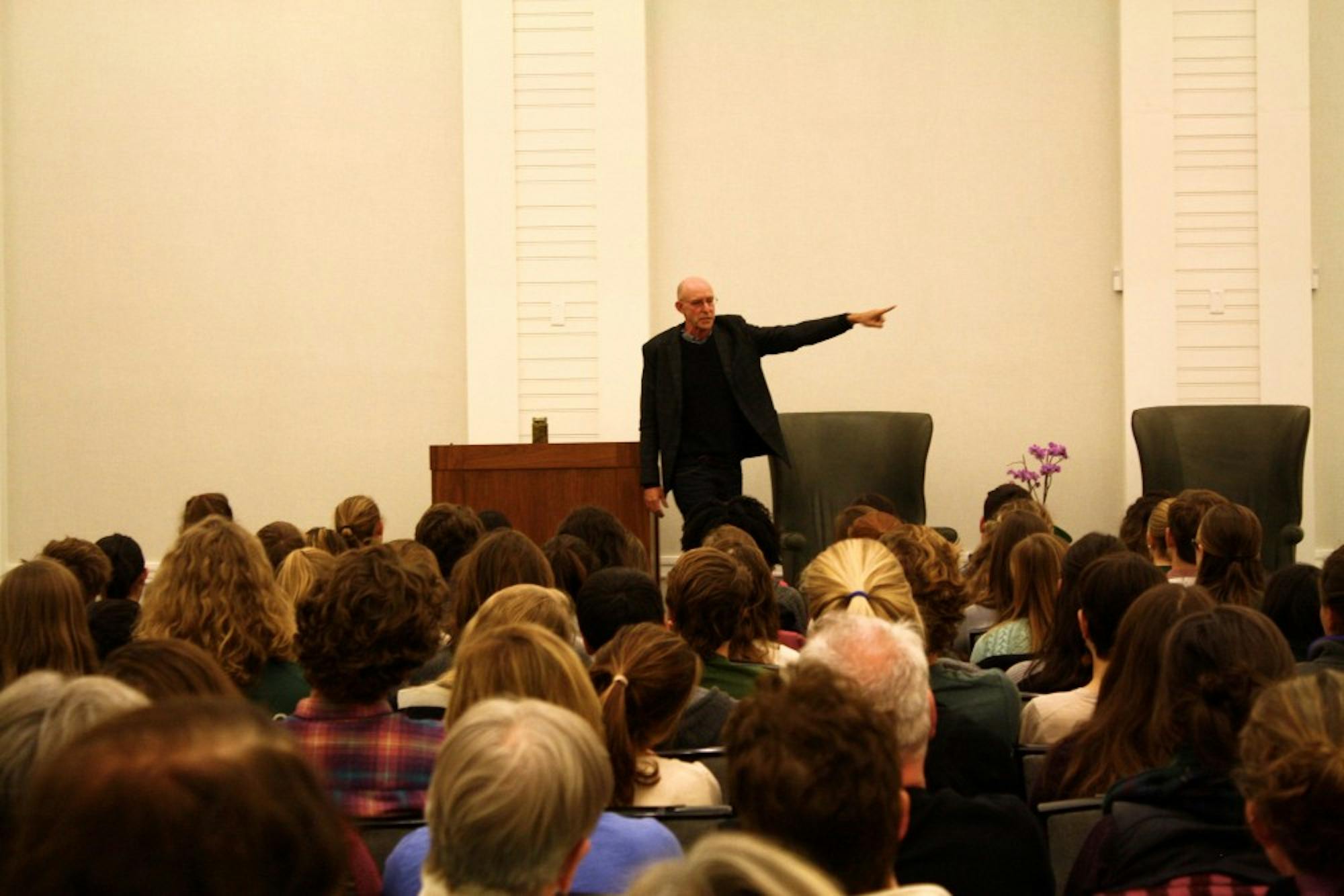Last night, about 500 students, faculty and community members filled the Hanover Inn’s Grand Ballroom — standing room only — to listen to a lecture by Michael Pollan, an award-winning journalist and author of nine books on food, diet and agriculture. As this year’s George Link Jr. Environmental Awareness Lecture, the event coincided with National Food Day, a nationwide celebration urging Americans to change food policies and the way we eat.
Pollan, a professor at the University of California at Berkeley Graduate School of Journalism, is best known for his 2006 book, “The Omnivore’s Dilemma: A Natural History of Four Meals,” and for his catch-phrase: “Eat food. Not too much. Mostly plants.”
“He is one of the most articulate, influential thought leaders in the arena on issues that connect food, how our food is grown, [and] what are the impacts on the environment and on our health,” said environmental studies professor Anne Kapuscinski, who introduced Pollan at the event.
Pollan talked about the process by which he wrote his new book, “Cooked: A Natural History of Transformation.”
Pollan began by discussing his earlier books, which focused on the industrialization of food production. He argued that our desire for fast food dictates the process by which our food is produced.
“[The fast food industry] has driven the industrialization of our agriculture,” Pollan said. “Our desire for a nice long french fry leads to a whole chain of consequences leading back to a pesticide.”
He added that large corporations ultimately cook food differently than people do by using the cheapest possible raw materials and excesses of salt, sugar and fat.
Cooking can be a potential solution to the growing industrialized food system, Pollan said. To set the stage, he made the following comparison: In 1965, people spent an average of one hour per day on home cooking. Today, people spend only 27 minutes a day on home cooking.
The effect of this discrepancy is profound: “People who eat home-cooked meals eat better diets and weigh less than people who don’t,” Pollan said. “When you let corporations cook for you, you lose control of your diet.”
Pollan also discussed that as television cooking shows grow in popularity, people now spend more time watching cooking on TV than cooking themselves, something he calls the “food paradox.”
In closing his speech, Pollan emphasized the many benefits that cooking brings to our society. Cooking, he said, makes food more nutritious, and has allowed humans to evolve smaller guts and larger brains than other primates. More importantly, he argued, cooking is a means by which individuals can protest against the specialization of food production by what he calls “Big Food.”
“I really believe that cooking is a political act, a therapeutic act, an agricultural act,” Pollan said.
Following the lecture, Pollan engaged in a 30 minute conversation with Kapuscinski. The event concluded with a brief question and answer session followed by a book signing.
Kapuscinski said Pollan’s expertise lent a unique opportunity to combine the annual George Link Jr. lecture with Food Day celebrations. At the College, Food Day programming has occurred over the last two weeks, including apple picking, an Organic Farm Fest and last Thursday’s Harvest Dinner at the Class of 1953 Commons.
Oliver Edelson ’18, an environmental studies major, helped facilitate the event. Edelson is part of an organization called Plate of the Union, which promotes a food policy campaign on campus.
“A lot of what Mr. Pollan has worked on his whole life — studying how we as a society relate to our food — is a really exciting viewpoint to hear,” Edelson said. “I think food is extremely important to our makeup, and I don’t think it’s given its time. To hear people dedicate their career to it is really exciting.”
Pollan gave the George Link Jr. lecture once before at the College in 2004. This combined with his growing notoriety in his field prompted the environmental studies department to invite him back, Kapuscinski said.
“It was clear he’s a very humble, down-to-earth person, and he cares a lot about education,” she said. “I think he’s very interested in how young people are interacting with food issues.”




